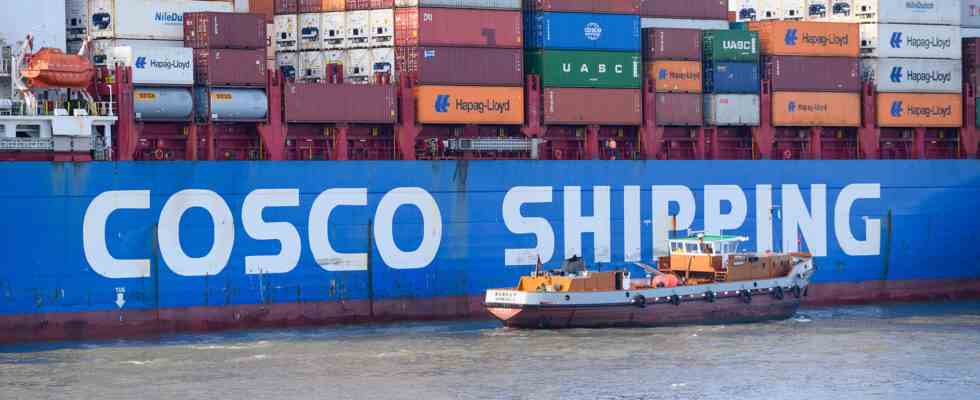comment
Status: 10/30/2022 11:01 am
What China is planning has been clear for years: exert influence. Therefore, the federal government should have clearly rejected the Cosco deal in the port of Hamburg. Because now Chancellor Scholz is traveling to Beijing with a sensitive “courtesy gift”.
Why was Xi Jinping smiled at internationally when he presented his global infrastructure project at the very beginning of his first term: the New Silk Road. The goal: to restore the old trade routes across Asia to Europe at the height of the Chinese Empire. And much more. Many a person does not seem to have understood how serious he is about bringing China back to its former glory.
Anyone who has just noticed during the debate about the Port of Hamburg that China already has a stake in many ports around the world: congratulations. You don’t have to look far for it. The Chinese state-owned company Cosco, which also wants to get involved in Hamburg, is already present in the largest ports in Europe: Rotterdam and Antwerp. In Greece at the port of Piraeus, Cosco even has a majority of 67 percent of the shares. The port is in Chinese hands.
No hysteria, but healthy skepticism
It may be that buying stakes in port terminals isn’t all that unusual in the industry. Completely normal business with all the advantages that it brings – both for the port and for the shipping company. But then there are things that don’t require hysteria but healthy skepticism to differentiate between normal business and more.
In China, business and politics go hand in hand. A state-owned company is state-controlled. Party members sit in management. At Cosco, CEO Wan Min is even the party leader within the company. This role in the company – which we can hardly imagine – is even more important than being the CEO. So Chinese state-owned companies are acting in the interests of the Chinese Communist Party. They are instruments for enforcing the strategic goals of the state and party leadership.
It’s about economic and geopolitical interests
Economic and geopolitical interests are at stake. It’s about profit – to China’s advantage. Even theoretically about the military use of civilian infrastructure, for example to supply the military with supplies. This is enshrined in China’s National Defense Traffic Law.
The individual infrastructure projects in which China is investing in other countries around the world – for example railway lines, ports and dams – are like individual pieces of a jigsaw puzzle that China has been gradually putting together to form a picture for several years. You could also say: like four wins. If you don’t look properly, lo and behold: a trade network that gives the Chinese state and party leadership more influence and room for maneuver worldwide. And the crazy thing is: What China is planning has been clear for years.
“No” – without a decimal point
How Germany wants to deal with it: In the case of the Port of Hamburg, that has been decided by the German side. Cosco may have a smaller piece of the puzzle than the company hoped. Instead of 35 only 24.9 percent. Cleverly saved again with a decimal point, with which Cosco should not have any influence on decisions at the Port of Hamburg. The Chinese would say “Renzhen”: very conscientious. That’s how Germans are often seen in China, and it’s usually taken as a compliment. In this case, it would have been good to simply say “no” – without a decimal point. Because Chancellor Olaf Scholz does not have to arrive with critical infrastructure as a courtesy gift during his state visit next week.
For the Chinese state and party leadership, the whole debate in Germany is annoying. The State Department has warned against speculation. It’s not surprising that Cosco wasn’t thrilled either: no company likes bad PR. And certainly not China.
Why the deal can also burst if China wants to: Because in case of doubt, China sees itself in the power to say: You are not that important either. Because China is not just relying on one strategy. Global trade: Yes – but also self-sufficiency. That means: If you want to work with us, you’re welcome. If not, then not.
Editorial note
Comments always reflect the opinion of the respective author and not that of the editors.
Comment: Four in a row – China, Cosco and the New Silk Road
Eva Lamby-Schmitt, ARD Shanghai, 10/30/2022 11:03 a.m

